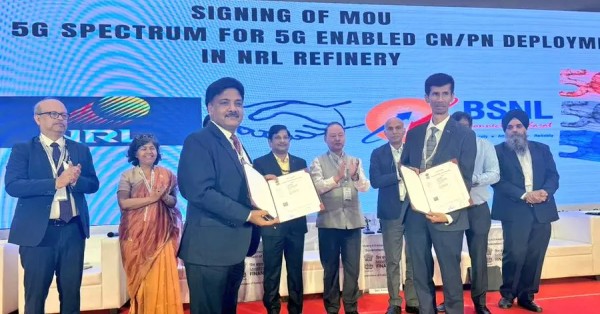ŠKODA AUTO has launched a mobile private 5G network in cooperation with Vodafone at its Mladá Boleslav site. For the carmaker, the ultra-fast and reliable data transmission technology opens up new possibilities in production. The pilot project aims to comprehensively test and further develop the technology under real-life conditions.
Christian Schenk, ŠKODA AUTO Board Member for Finance & IT, says: “The private 5G network is a milestone for ŠKODA AUTO on its journey towards becoming a Smart Factory. The technology offers enormous potential for future innovations, for example, in predictive maintenance and optical inspections in body construction. Under the recently launched pilot project, we are testing 5G in everyday operations, and we will also be evaluating future uses of this technology to make us even more efficient and flexible.”
Michael Oeljeklaus, ŠKODA AUTO Board Member for Production and Logistics, adds: “The 5G standard also opens up new possibilities for autonomous transport in logistics, augmented reality in production and many other applications. One example is the FATA MORGANA application that enables remote support between maintenance and technical experts in two different continents by creating a real-time digital twin and communicating using 3D objects in augmented reality. This technology takes advantage of the much faster flow of data and lower latency of 5G connectivity. Microsoft HoloLens 2 glasses also improve the efficiency of the digital twin of the scanned area.”
The 5G research network allows data to be locally transmitted securely in real time. The solution uses 5G Standalone (SA) technology, which is one of the first SA 5G commercial deployments in the Czech Republic. ŠKODA AUTO’s network uses a private frequency spectrum, which is unique to the ŠKODA AUTO smart factory; it enables reliable, wireless data transmission and guarantees sufficient bandwidth even under high utilization. Thanks to 5G, latency, which is the time it takes to transmit data to sensors, machines, vehicles or other devices, may drop as low as a few milliseconds. This makes 5G technology significantly faster than WLAN or other wireless communication technologies.
The mobile private 5G network makes new technologies possible within the framework of the Smart Factory concept, for example in the areas of Industry 4.0, artificial intelligence and shared data. The next step will involve uploading data to finished vehicles via 5G. Another field of application is the intelligent networking of robots and wireless assembly tools.
ŠKODA AUTO has integrated the private 5G network into existing data networks in order to ensure the necessary data security and gain experience with deploying this technology. The technology will soon be extended to all areas of production and logistics. In the future, it will be used to autonomously transport vehicles and in predictive maintenance, and it will also be tested in combination with various devices at the ŠKODA FabLab.






























